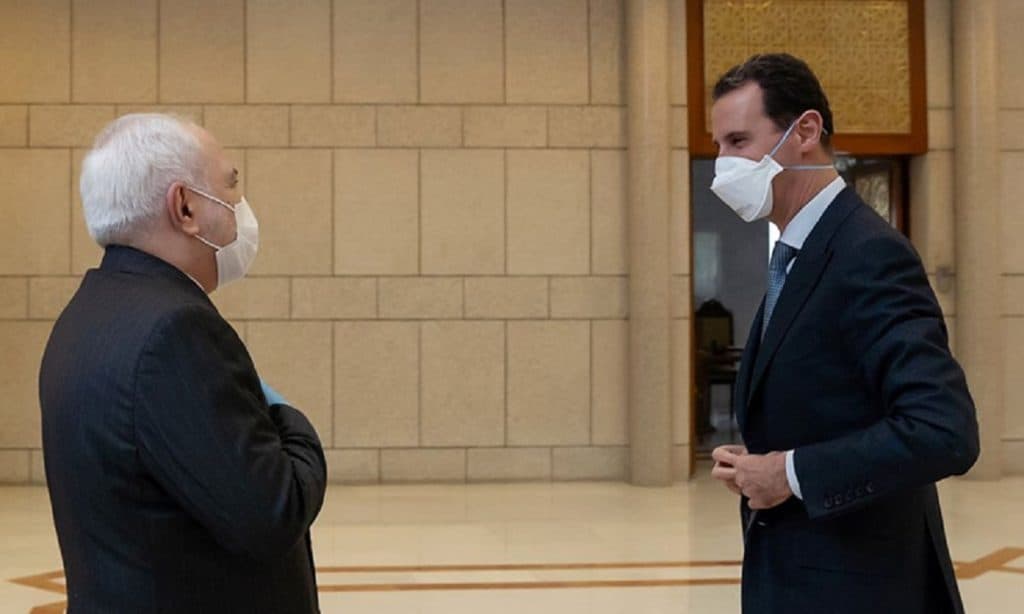By Denis Korkodinov
The format of the recent meeting of the head of the Iranian Foreign Ministry, Javad Zarif, on April 20, with Syrian President Bashar al-Assad and Syrian Foreign Minister Walid al-Muallom was unusual in the sense that this meeting was not agreed with Russia.
This circumstance gave rise to media rumor that Tehran intends to enlist the support of Damascus against Moscow. For this reason, the informal visit of the Iranian Foreign Minister to Syria aroused great interest from the international community.
The formal purpose of the meeting between Javad Zarif and representatives of the Syrian leadership was to show solidarity between the Ayatollah regime and Damascus. Nevertheless, a number of sources indicate that the Iranian Foreign Minister, speaking on behalf of the head of the Islamic Republic Hassan Rouhani and the Great Ayatollah Ali Khamenei, is trying to probe the ground for the possibility of Bashar al-Assad’s withdrawal from the alliance with Moscow.
As evidence, the sources argue that the Kremlin is currently extremely dissatisfied with official Damascus due to the fact that the Syrian Arab Army operating in Idlib has little interest in providing the Russian military with up-to-date information on the deployment of military forces and plans for conducting offensive operations on northwest Syria.
Based on this, experts conclude that Bashar Assad is rapidly losing support from Moscow, which Tehran intends to use. Moreover, according to a number of media reports, Russian-Syrian relations have begun to dress up due to the fact that because of the coronavirus pandemic, Moscow has significantly limited its military campaign in Idlib. With the increased activity of the Khayyat Tahrir al-Sham group operating in the region, the operations of the Syrian Arab Army without the support of Moscow became difficult, which causes serious concern for official Damascus.
In addition, there is an opinion that, against the backdrop of the coronavirus pandemic, in the Iran-Amenican relations a feedback channel appeared through Syria. And the visit of Javad Zarif to Damascus was actually the first signal to use Bashar al-Assad as an instrument of bargaining with the United States.
According to some experts, during a meeting with the Syrian president, Javad Zarif could try to persuade him not to impede American interests in the region and allow Washington to extract oil in northeast Syria without fear of an attack by the Syrian Arab Army. Meanwhile, based on the fact that Tehran is completely not interested in dialogue with the United States, and the Iranian Foreign Minister is also on the US sanctions list, it is unlikely that Javad Zarif could express the interests of the White House during a meeting with Bashar Assad .
The version of the fact that the Iranian foreign minister, while in Damascus, aimed at agreeing on a number of key issues on the eve of the next meeting in the framework of the Astana format, looks quite plausible. Since the government of Bashar al-Assad is not a party to the summit in Astana, Tehran could take on the functions of a mouthpiece of Syrian interests in order to subsequently make certain concessions from Damascus. And because the Astana format still represents the foundation of Russia’s regional policy in the Middle East, it can be assumed that Iran is really extremely interested in adjusting its positions in Syria on the eve of the meeting of the “troika” (Russia – Iran – Turkey).
In turn, the need for a Syrian tour of Javad Zarif was also caused by questions related to the continuation of the consequences of the COVID-19 pandemic. The head of the Iranian Foreign Ministry in dialogue with Bashar al-Assad guaranteed him assistance in supplying the necessary medical equipment, despite the fact that Iran, which is also under sanctions, is in dire need of medicine. Nevertheless, Tehran, proceeding from allied relations, is ready to lend a helping hand to Syria, which, of course, was on the agenda of the Iran-Syrian meeting.
(The opinions expressed in this article are solely those of the author and do not necessarily reflect the views of World Geostrategic Insights)
Image source: Facebook page of the Presidency of the Syrian Arab Republic







